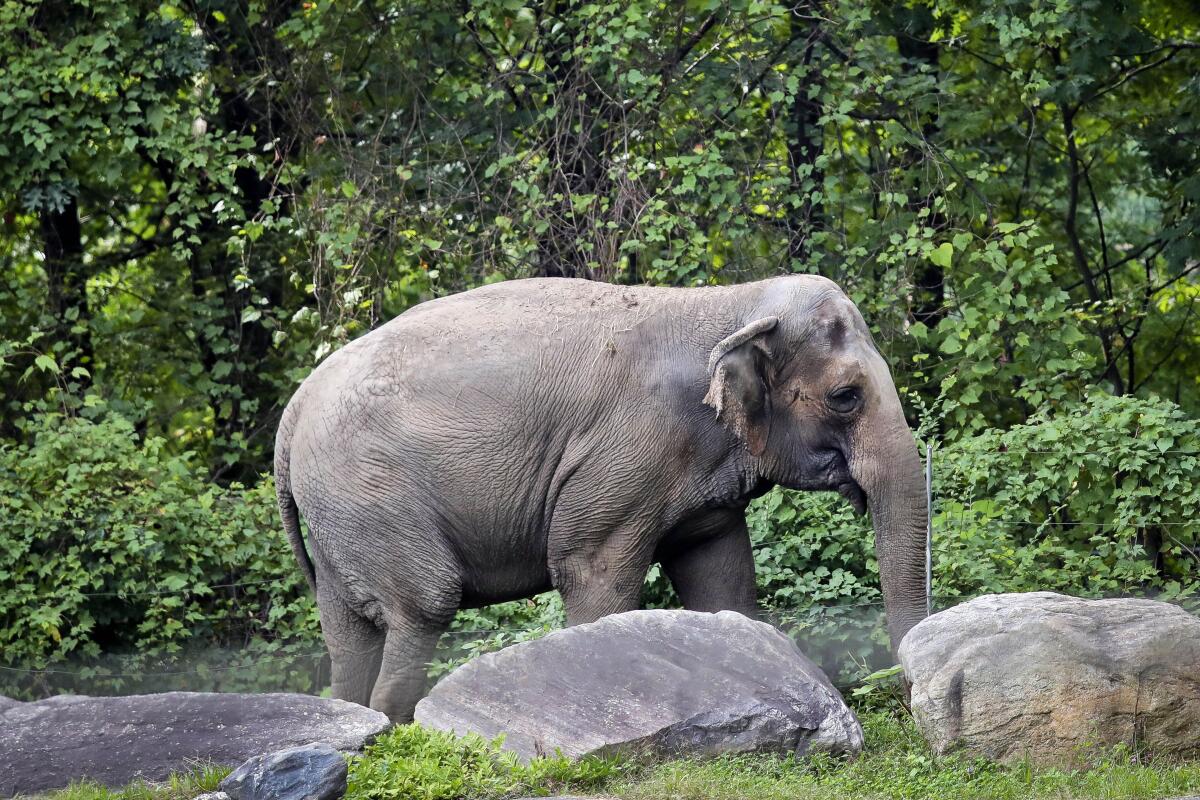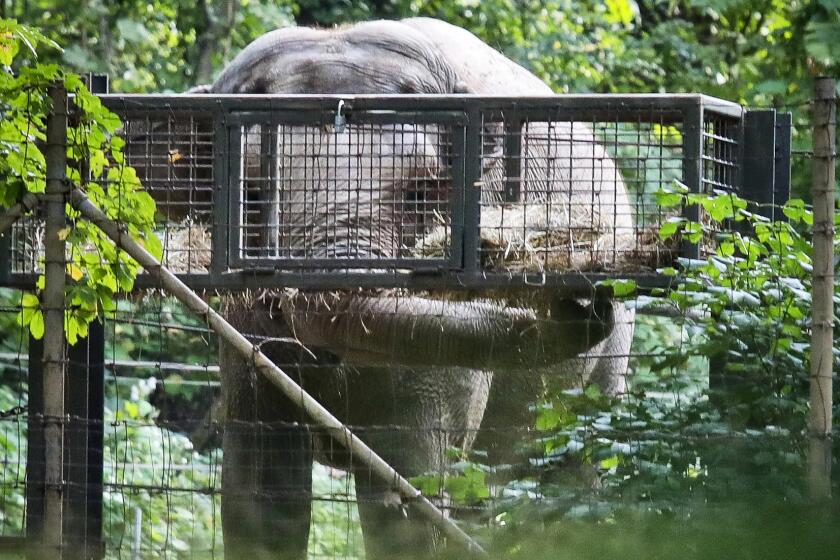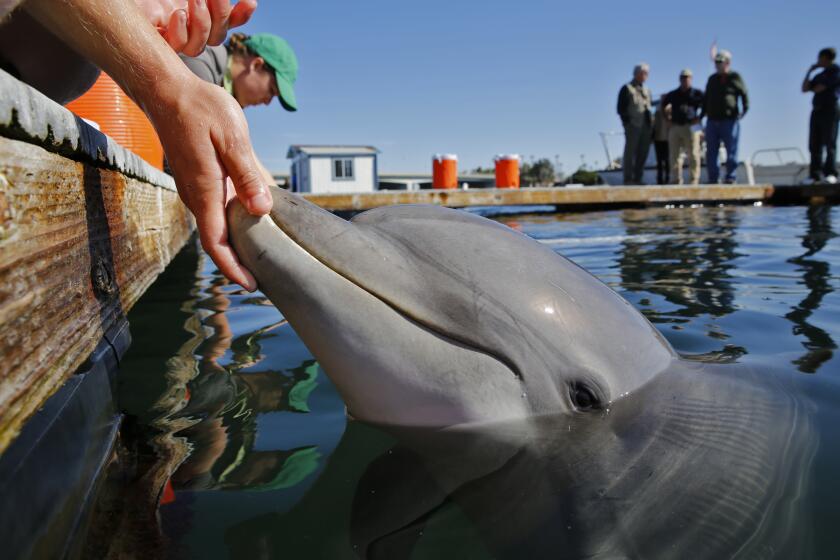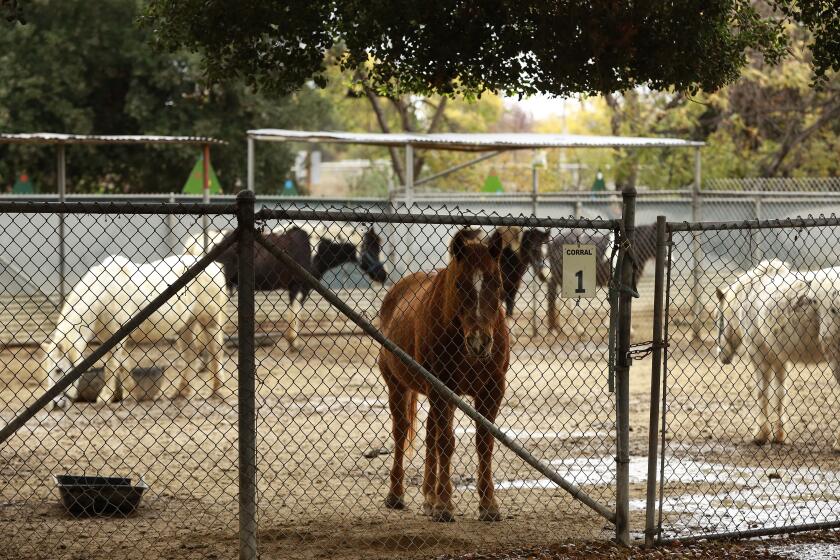Opinion: Why shouldn’t elephants have rights? They’re intelligent beings who can feel joy and sorrow

- Share via
The California Supreme Court is considering whether to grant a hearing for three elephants — Nolwazi, Amahle and Mabu — at the Fresno Chaffee Zoo. If granted, the hearing would determine whether these elephants are being unjustly detained, and whether they should be relocated to a sanctuary.
Elephants are sensitive, intelligent beings who feel joy and sorrow, have meaningful projects and relationships and often walk many miles per day in the wild. As a result, they tend to suffer in captive environments like zoos. When their freedom is restricted, they have an increased risk of developing joint disorders and damaged tusks. They also are more likely to experience boredom, depression and aggression.
A new case in California will test the theory that captive elephants should be allowed to petition for their liberty.
Accordingly, the Nonhuman Rights Project, which submitted the petition, is urging the court to recognize that Nolwazi, Amahle and Mabu have a right to bodily liberty in a habeas corpus hearing, which can be used to determine whether their detention is lawful. Scholars in a wide range of fields, myself included, are submitting amicus letters to the court in support of the basic idea of elephant rights.
Why is it necessary to recognize elephant rights? Why not simply rely on existing welfare protections to prevent cruelty? When elephants are seen as lacking rights, we can protect them as “property” or as a matter of public interest. But such protections leave elephants vulnerable when their “owners” and the public are insufficiently concerned about them. By recognizing elephant rights, we can safeguard against abuse and neglect even when welfare protections are inadequate.
The idea of elephant rights is surprisingly minimal. When we say that elephants have rights, we are not necessarily saying that they have the same rights as us. (Among human beings, for example, infants have different rights than adults.) We also are not saying that they have duties. (Again, infants can have rights without duties.) Our claim is only that elephants can have rights that reflect their own interests and vulnerabilities.
Additionally, recognizing that elephants have a right to liberty does not necessarily mean releasing them into the wild; elephants, like humans, may not always be able to live independently. Instead, it simply means granting elephants as much freedom as possible for them. In the case of Nolwazi, Amahle and Mabu, that means being released to a sanctuary accredited by the Global Federation of Animal Sanctuaries.
Last year the Fresno Superior Court denied a similar petition for the elephants at the Fresno Chaffee Zoo because they are not being held in state custody, and the 5th District Court of Appeal denied a second petition. Now, the Nonhuman Rights Project is urging the California Supreme Court to decide that privately detained individuals, including elephants, can qualify for habeas relief too.
We need a new approach to animal rights that centers on their freedom to act — not just protecting them from harm — to save them from injustice.
This case is not the first of its kind. The New York Court of Appeals recently considered a similar petition involving Happy, an elephant at the Bronx Zoo. In 2021, the court granted a hearing on Happy’s habeas claim, marking the first time that the highest court in an English-speaking jurisdiction allowed such a hearing for a nonhuman animal. But the court ultimately sided with the zoo.
Thus far, the rationalizations courts have used to reject elephant rights show little basis in logic or the law. For instance, the majority in the Happy case argued that you can have rights only if you have specific genes (why?) and only if you can have duties (again, what about infants?). They also suggested that you can access habeas relief only if you can live independently (once more: infants).
The majority in the Happy case also expressed concern about a slippery slope: If an animal in a zoo has the right to liberty, what about animals in farms and labs? And if those animals have that right, how can society still function? Perhaps a decision with this much disruptive potential is best made by legislatures.
If we determine animal rights based on a ‘capabilities approach,’ then what happens to all the dogs we keep as pets and service animals?
However, as two dissenting judges noted, this buck-passing argument fails too. It might be ideal for legislatures to address this issue. But at present, few are willing to do so. In the meantime, the judiciary has a duty to assess each case before it on the merits. When a petitioner makes a credible allegation about an unjust detention, the relevant court should hear that case.
Moreover, if courts fear a slippery slope, the solution is not to ignore rights violations. Yes, when violations occur in large numbers, addressing them all might be disruptive. But to look the other way because of the scale of the problem would be to treat injustice, perversely, as too big to fail. Courts should instead make narrow rulings about particular violations, leaving the rest for another day.
To be sure, legislatures should address this issue too. Last month, Ojai became the first U.S. city to recognize legal rights for nonhuman animals when it passed an ordinance declaring that elephants have the right to liberty. Such legislation can work in tandem with, not replace, judicial attention to current unjust detentions.
The California Supreme Court needs to address the elephants in the room. However the judges decide this case, they should not refuse to hear it on the grounds that Nolwazi, Amahle and Mabu lack rights. Elephants, like humans, merit legal consideration for their own sake. Humans have both a right and a duty to give them their day in court.
Jeff Sebo is an associate professor of environmental studies, affiliated professor of bioethics, medical ethics, philosophy and law, and director of the animal studies master of arts program at New York University. His most recent book is “Saving Animals, Saving Ourselves.”
More to Read
A cure for the common opinion
Get thought-provoking perspectives with our weekly newsletter.
You may occasionally receive promotional content from the Los Angeles Times.













